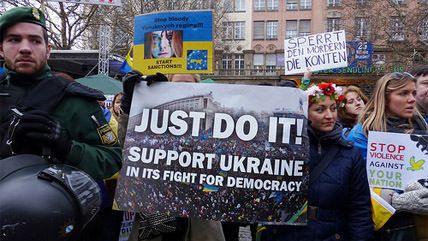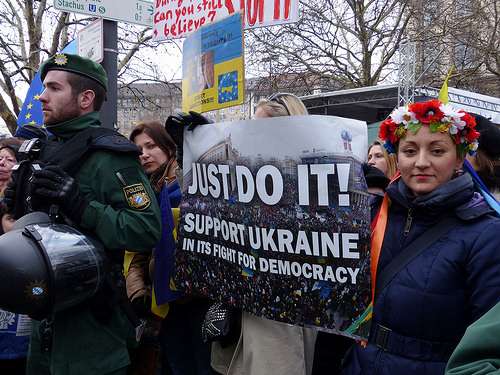One Reason the Ukrainian Revolution May Yet Succeed


Ukraine is in crisis. There are reasons to question the staying power of its revolution: the lives and infrastructure lost in the process, the legitimacy and savvy of the interim leadership, the hobbling economy, Crimea's separatist movement, and most recently Russia's invasion.
What could keep the nation on a path toward a stable, democratic governance? "A revolution of the mind," says Oksana Romaniuk, the executive director of a free speech and media-focused NGO. She departed from Ukraine earlier this week to attend a human rights conference in California, and spoke with Reason about the situation in her home country.
Romaniuk contrasts the current Euromaidan revolution with the nation's last "revolution" in 2004. "The Orange Revolution was easy. People came out to the streets, stood out for a month, and everything was solved in court. The problem was that people left the streets and there was a big credit of trust to the Yushchenko administration," which promised to turn toward western, liberal policies. But, the public and the press "didn't check his activities. The first criticisms of Yushchenko came maybe eight months after his appointment. It was wrong," she says, and real change never materialized.
The Orange Revolution failed to change what Romaniuk describes as Ukraine's "paternalistic society," but "now we understand that everything depends on us and we are ready to take responsibility. The biggest difference is that we put demands to the new government from the very beginning." She suggests that the current leadership is subject to much skepticism from constituents. Even as Russia geared up for invasion, the Kyiv Post found time to criticize Ukraine's opposition installed-leadership.
Romaniuk highlighted the case of former Prime Minister Yulia Tymoshenko. Although she aligns herself with the opposition and receives sympathy for having been a political prisoner, Tymoshenko "didn't pass through that transformation with us. She doesn't understand that the situation has changed and we won't fall for emotions." A recent polls shows Tymoshenko would receive only 10 percent of the vote if the presidential elections were held now.
As one protester told Reason in January, "People support the opposition leaders," but "no one among the leaders can control Maidan, because… the people control their leaders."
Although seriously constrained leadership may be a handicap while Russia flexes its military might, Ukraine's revolutionary mindset may be key to resisting foreign rule.
"It's a mistake to say the Russian speaking community is happy with Putin. They do not want him," believes Romaniuk. "We just got rid of our own corrupt government" and aren't looking to submit to another one.
Indeed, a recent poll "found there is not a single region in Ukraine where there is a majority in favour of unification with the Russian Federation. In Crimea, where pro-Russian sentiments are the strongest, 41 percent were in favour of unification with Russia," notes former Reason contributor Guy Bentley at City A.M.
Read more Reason coverage of Ukraine here.


Show Comments (13)